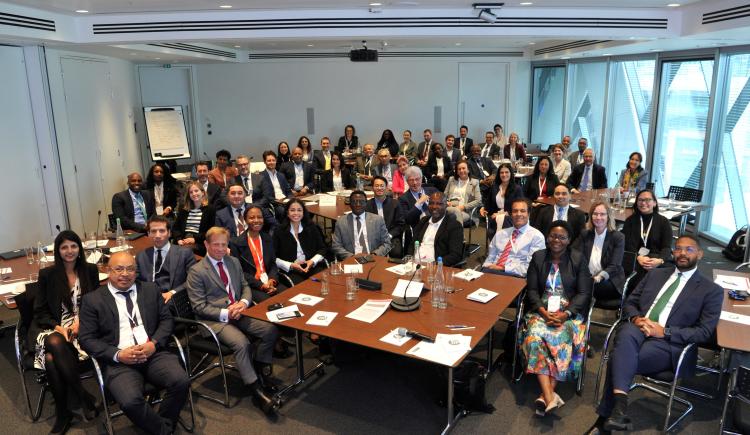Insurance Development Forum (IDF)-World Bank Group Knowledge Hub Day and IDF Summit

June 2024 saw London play host to several high-profile events tailored to share the insurance sector's experience on designing and implementing effective climate and disaster risk financing strategies. The Insurance Development Forum (IDF) and World Bank Group (WBG) Knowledge Hub Day, held on Tuesday 11th June, and the IDF Summit, held on Wednesday 12th June, were convened by the IDF in collaboration with the Disaster Risk Financing & Insurance Program (DRFIP) and the Global Shield Financing Facility (GSFF). The two events hosted over 30 delegates from 21 WBG client countries specialized in disaster risk finance. The two-day event was preceded by a rare, guided tour of Lloyd’s of London a day earlier, where delegates got a up close glimpse into the history of insurance.
The IDF and WBG Knowledge Hub Day was held as part of our IDF - GSFF Knowledge Partnership. The Knowledge Partnership was officially announced during the Knowledge Hub Day by Olivier Mahul (Practice Manager, Crisis and Disaster Risk Finance, WBG) and Ekhosuehi Iyahen (Secretary General, IDF). The partnership aims to expand access to Climate and Disaster Risk Finance and Insurance (CDRFI) in developing countries, in particular, those who are most vulnerable to increasing climatic shocks. This will be achieved through the facilitation of knowledge exchange on tailor made financial solutions being designed through GSFF engagements and through IDF engagements, as well as through the offer of collaborative capacity building programs to vulnerable countries that leverage the expertise of public and private sector. It is based around three core pillars: (i) project specific knowledge exchange, (ii) thematic knowledge partnership, and (iii) executive education programs.
The Knowledge Hub Day was intended to expose WBG country clients from low- and middle- income countries to industry expertise and enhance their understanding of what industry can offer. The aim of this invite-only event was to strengthen countries’ understanding of the role of insurance and to pave the way for increased engagement with the insurance industry and its capabilities, in particular levering domestic insurance markets, going forward. The invited delegates were all high-level representatives from Ministries of Finance, National Banks, Insurance regulators, from across the world including Angola, Indonesia, Kyrgz Republic, Laos PDR, Madagascar, Malawi, Zambia, Morocco, Mozambique, Nepal, Pakistan, Peru, Philippine, Rwanda, Sao Tome and Principe, Sierra Leone, Somalia, Tajikistan, Tunisia, Uganda, and Zambia. The day offered a variety of sessions focusing on insurance markets, country insights on CDRFI, and risk modelling and risk understanding. A panel discussion opened the floor for delegates to exchange views on the challenges facing their respective countries, including poor availability and quality of risk data, significant budget restrictions and large protections gaps fueled by low insurance penetration.
The IDF Summit 2024 was held the next day under the theme "Why Insurance Matters: Prevent, Protect, Provoke”. The Summit brought together leading independent voices, that shared their views on the critical role of the insurance industry. This attendance of country delegates, supported by the WBG, provided an opportunity to hear Emerging Market and Developing Economies (EMDE) country perspectives in several high-level panels. The summit focused, above all, on finding sustainable solutions and offering practical insights into lessons from implementation. The day offered a variety of insightful sessions from global uncertainty and future risks to building SME resilience. Pablo Saavedra (Vice President, Equitable Growth, Finance and Institutions, WBG) participated in the roundtable: Reforming the International Financial System and the Role of Insurance. Ethiopis Tafara (Vice President, Chief Risk, Legal & Sustainability Officer and Partnerships, MIGA, WBG) took part in the session on mobilizing insurance sector investments into resilient infrastructure in developing and emerging economies. The WBG further participated in the Financial Protection of Public Assets session and led the Adaptive Social Protection & Risk Financing.
The two days provided many thought-provoking sessions, with the participants taking away with them new ideas for opportunities to strengthen disaster risk finance and insurance in their own countries and regions. The role of insurance as a source of protection and a facilitator for investment was clearly demonstrated throughout the summit and ultimately risk transfer mechanisms like insurance should be part of a wider dialogue on disaster resilience. However, it was also emphasized that insurance is not always the solution and continued coordination between government ministries and the private sector can help design appropriate disaster risk financing instruments and provide empirical evidence for policy decisions.
To learn more about Disaster Risk Finance, please visit Financial Protection Forum.
Join the Disaster Risk Finance Community of Practice and the Disaster Risk Finance Community on LinkedIn.
For more information, please write to drfip@worldbankgroup.org
